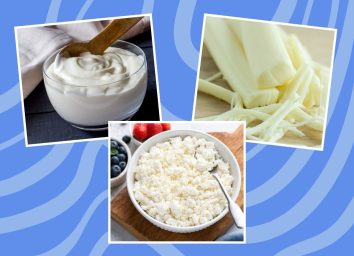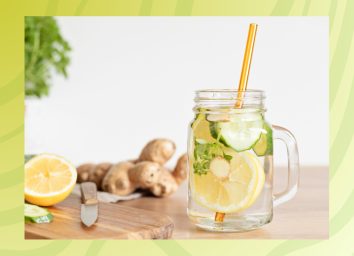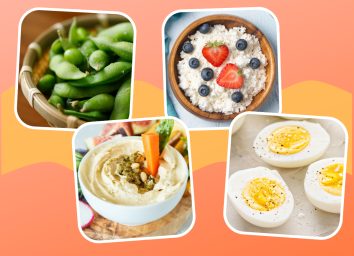13 Foods That Make You Gassy
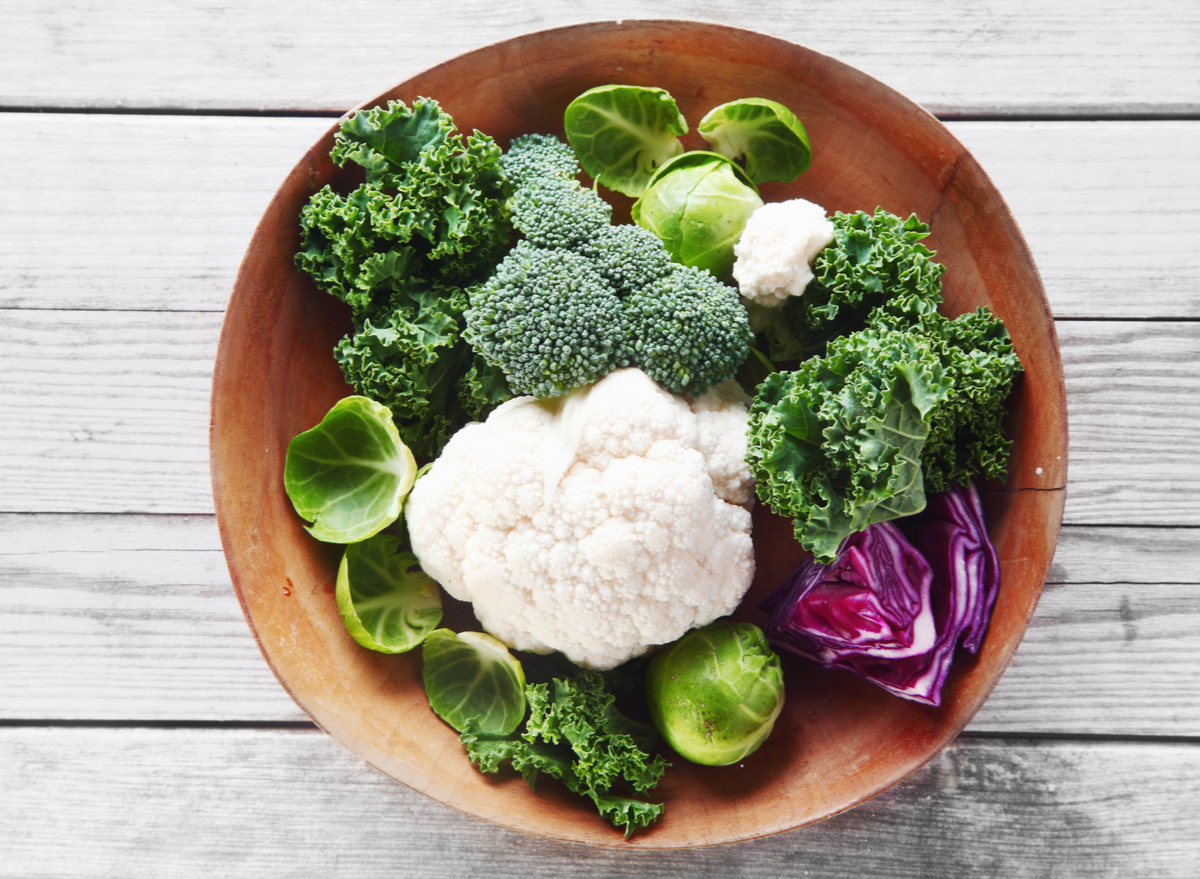
There's no getting around it: some foods just make you gassy. You could probably name the most common offenders (remember the "beans, beans, the magical fruit" ditty from playground days?), but it's not just legumes that can give you excess gas. A whole smorgasbord of other foods can be the underlying cause for unmitigated tooting.
Many foods that make you gassy are actually super healthy—so you may not want to remove them from your diet entirely. But if you've got an important meeting, romantic date, or any other good reason to keep gas in check, you may want to ease up on the following foods. Read on, and while we're on the subject, don't miss 16 Foods To Help You Poop Immediately.
Oats
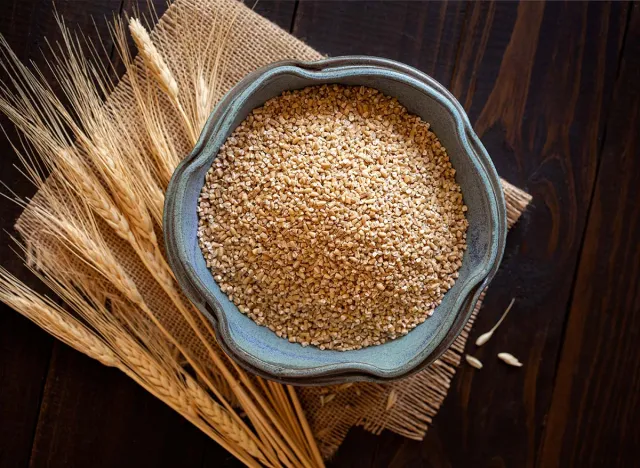
Although oatmeal makes an excellent choice for a healthy breakfast, your morning bowl could be a hidden source of gas later in the day. "Oats can cause gas in some people due to their high fiber content," says Wan Na Chun, MPH, RD, of One Pot Wellness. "Fiber is a form of carbohydrate that your body doesn't digest, but bacteria in the large intestine break it down, leading to the creation of methane gas or hydrogen sulfide, which is the most common sulfur gas in flatulence."
According to Chun, there are steps you can take to make your oats less gas-producing. "You can cook oatmeal with only water and add digestive enzymes or foods known to help digestion, like lemon, ginger, fennel, and peppermint."
Seeds
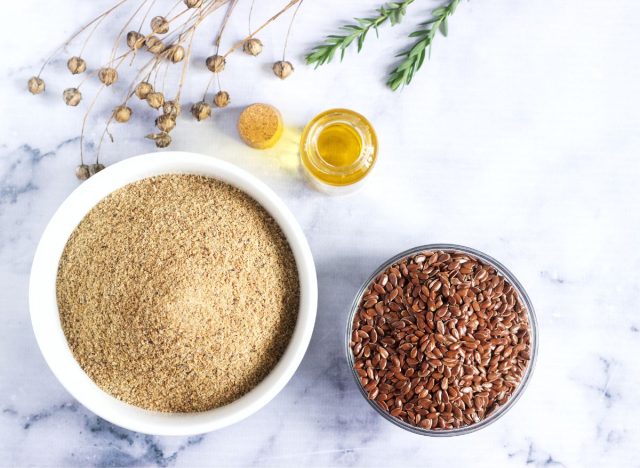
"One food that people often forget that causes gas is seeds, like flax or chia," says Emily Oschmann, RDN, of Healthy By Emily. "This happens because of the amount of fiber they contain that our bodies are not able to breakdown and digest." Oschmann's tip for avoiding the bloat: use ground chia or flax seeds. They'll not only give you less gas, they amp up the fiber and healthy fats in smoothies, puddings, and more.
Beans
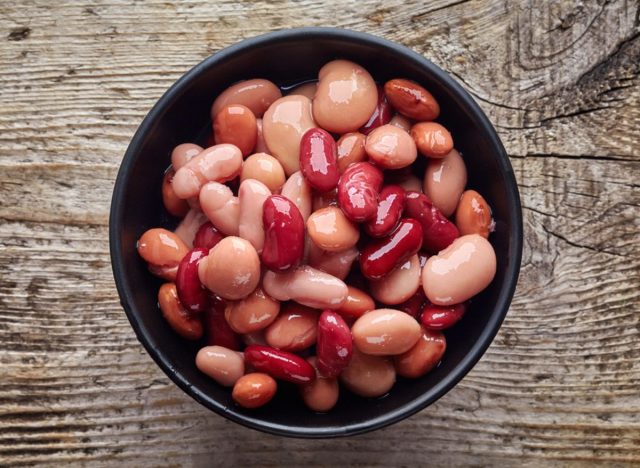
They may not be the sole dietary source of toots, but beans are undoubtedly the most iconic farty food. Ever wonder why beans give you gas? "They contain oligosaccharides, which are complex sugars that are not easily broken down by enzymes in our digestive system," explains Samantha Podob, MS, RD, CDN, owner of Podob Nutrition. "This can result in fermentation by gut bacteria and the production of gas."
Fortunately, the right cooking method can make take beans' gas-producing power down a notch. "To minimize gas when consuming these foods, it can be helpful to soak them overnight before cooking. This will help to reduce the oligosaccharide content and make them easier to digest," Podob says.
Lentils
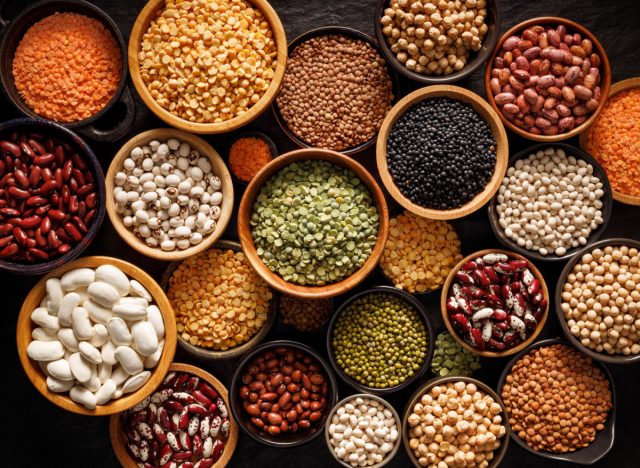
Beans and lentils are both part of a family of plants known as pulses—so it's no surprise that lentils are another top culprit for gas. "Lentils contain a great source of fiber and are also high in FODMAPs, a type of fermentable carbohydrate that may cause excess gas and bloating for those who struggle with Irritable Bowel Syndrome (IBS)," says IBS and gut health dietitian Samina Qureshi, RD.
As with beans, an overnight soak can quell lentils' gassy effects. Another tip: "You can also opt for canned varieties. Be sure to strain and rinse them before consumption," Qureshi recommends.
Sugar-free candy

Do you tend to reach for sugar-free candy as a lower-calorie alternative to the full-sugar stuff? You might inadvertently be setting yourself up for digestive distress. "The culprit lies in the [sugar alcohols] used to replace sugar, such as sorbitol, mannitol, or xylitol, which can ferment in the gut and cause gas production," says Atlanta-based registered dietitian Jessie Hulsey RD, LD. If you choose sugar-free sweets, keep your consumption moderate to prevent gas.
Broccoli
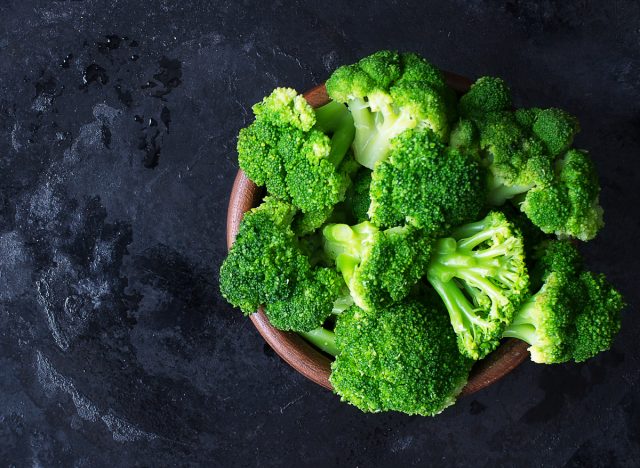
If you were to name classic gassy foods, broccoli would probably be on the list. As a member of the cruciferous vegetable family, it's rife with gas-inducing compounds. "Cruciferous vegetables contain raffinose, a complex sugar that is difficult to digest, leading to gas production," says Chun. "These vegetables are also high in fiber, which can increase gassiness."
Of course, broccoli is a super-healthy food, so if you'd like to keep eating it without the noisome aftereffects, try cooking it, rather than eating it raw, and stick to smaller portions.
Cauliflower
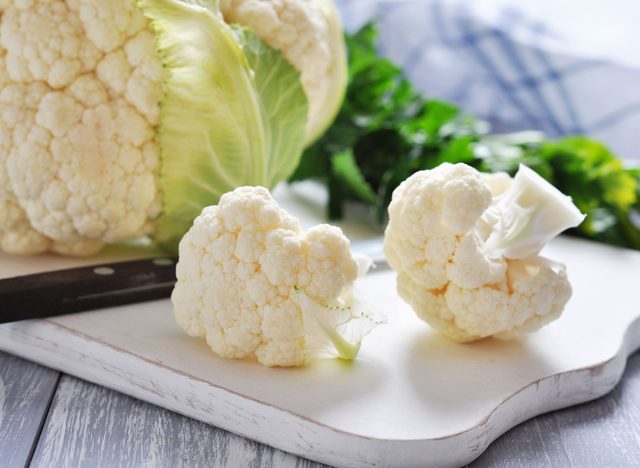
Cauliflower is another cruciferous culprit for gas due to its raffinose. According to Chun, pairing it with other foods that are easier to digest can help keep gas at bay. Try roasted cauliflower with a lean meat like chicken or salmon or pair it with a side of easy-to-digest white rice.
Milk
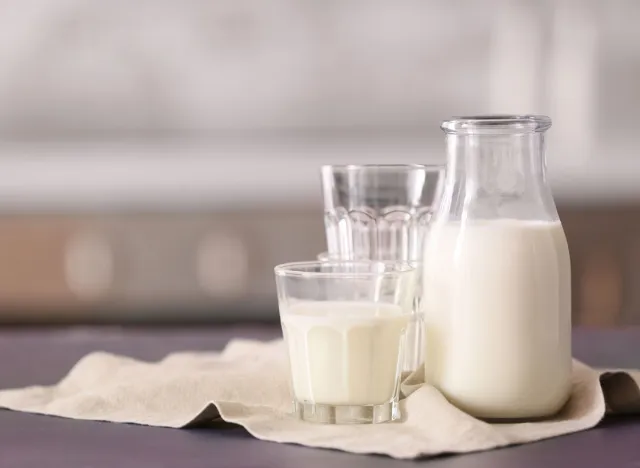
A surprisingly high percentage (an estimated 68% of the population) is intolerant to lactose, the sugar in milk. If you belong to the two-thirds of the planet with lactose intolerance, you may have trouble digesting milk without incurring some serious gas. Consider soy milk as an alternative to the usual cows' milk—it has comparable protein and is often fortified with vitamin D, calcium, and other nutrients.
Cabbage
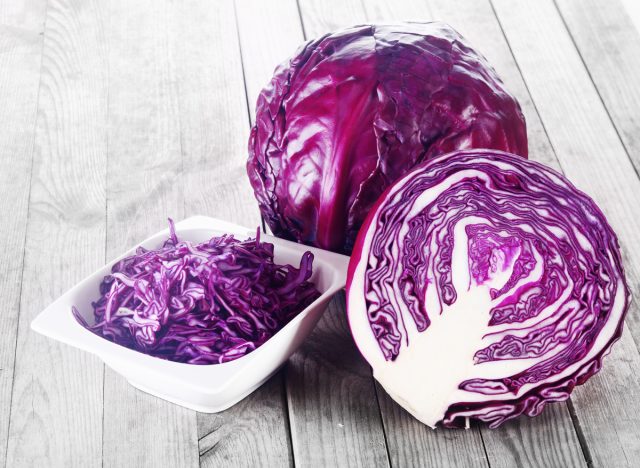
Those pesky cruciferous veggies! Cabbage is yet another one that can stir up unwanted bubbles in your digestive tract. Its high fiber content and raffinose are a double whammy for gas. In addition to cooking it before eating, Chun emphasizes that thorough chewing can minimize gas from cabbage. "Chewing food thoroughly can help reduce the amount of air swallowed while eating, which can reduce gas production."
Cheese
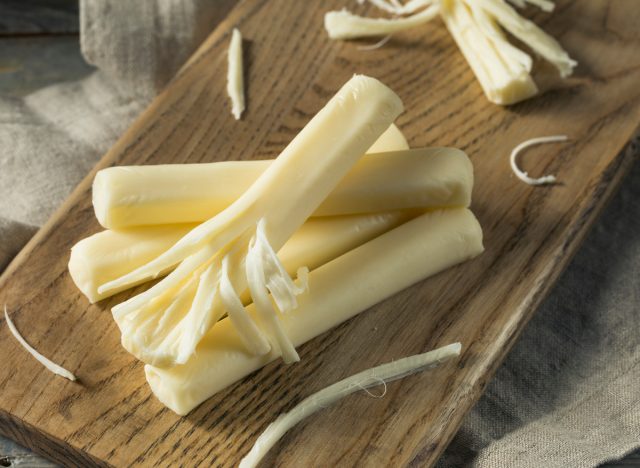
For lactose intolerant folks, some cheeses have enough lactose to upset the digestive tract, causing gas and bloating. But that doesn't mean you have to give up cheese altogether! Lower-lactose hard cheeses like Swiss or cheddar are unlikely to cause symptoms, according to the Mayo Clinic.
Snack bars
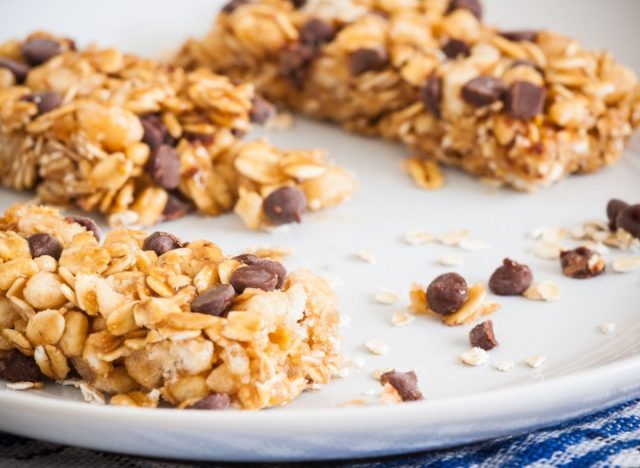
Want to avoid embarrassing gas post-snack time? Always check the ingredient labels on granola bars and protein bars. Many contain extra fibers known for their gaseous effects. "Common ingredients that you may see listed in the ingredient list include locust bean gum, chicory root fiber, inulin, beta-glucan, and psyllium husk," says Laura M. Ali, MS, RD, a culinary nutritionist based in Pittsburgh, PA.
Brussels sprouts
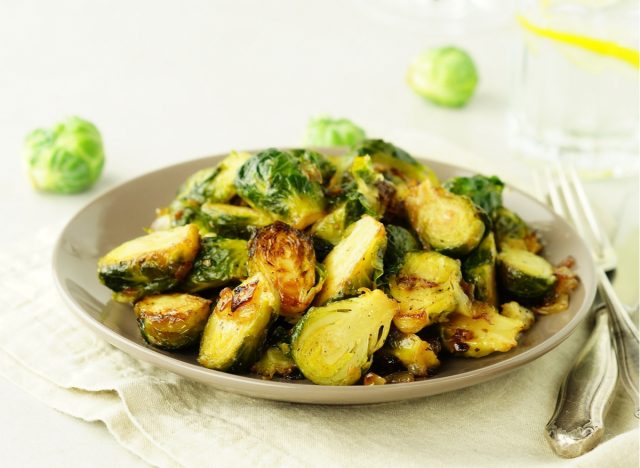
"Brussels sprouts are a nutritious and flavorful vegetable that can unfortunately lead to gas formation in some individuals," says Hulsey. As with broccoli, cauliflower, and cabbage, this is due to Brussels sprouts' membership in the cruciferous family.
Hulsey says certain cooking tweaks may make a meaningful difference: "Incorporating spices like caraway or turmeric into your cooking can aid digestion. Adding a squeeze of lemon juice while cooking may also aid in reducing gas."
Chewing gum
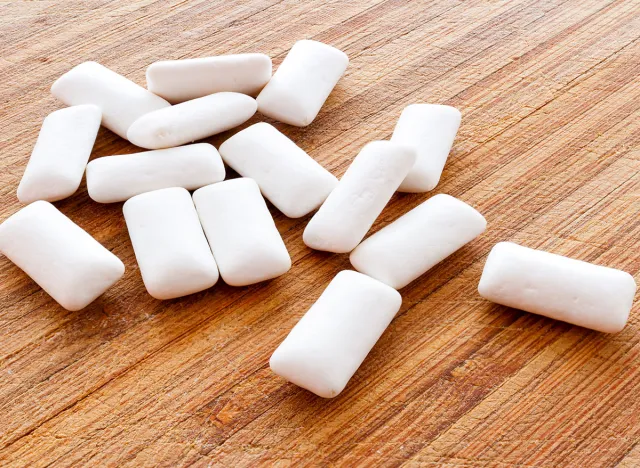
A stick of gum might freshen your breath, but it might not freshen the air after the fact because they are one of the foods that cause gas. "The act of chewing gum stimulates the production of saliva, and swallowing excessive air while chewing can contribute to gas buildup in the digestive system," Hulsey says.
Meanwhile, the artificial sweeteners used in many chewing gums are often bad news for your digestion. "Sorbitol is commonly used in sugar-free gums and candies. Many people are unaware that low-sugar sweeteners like sorbitol and xylitol (known as sugar alcohols) can cause gas, especially in people with IBS," says Anne Danahy, MS, RDN, of Craving Something Healthy. "These ingredients are highly fermentable by gut bacteria, and gas is a byproduct of fermentation." For fresh breath, consider a mint tea—or simply brush your teeth after eating.

